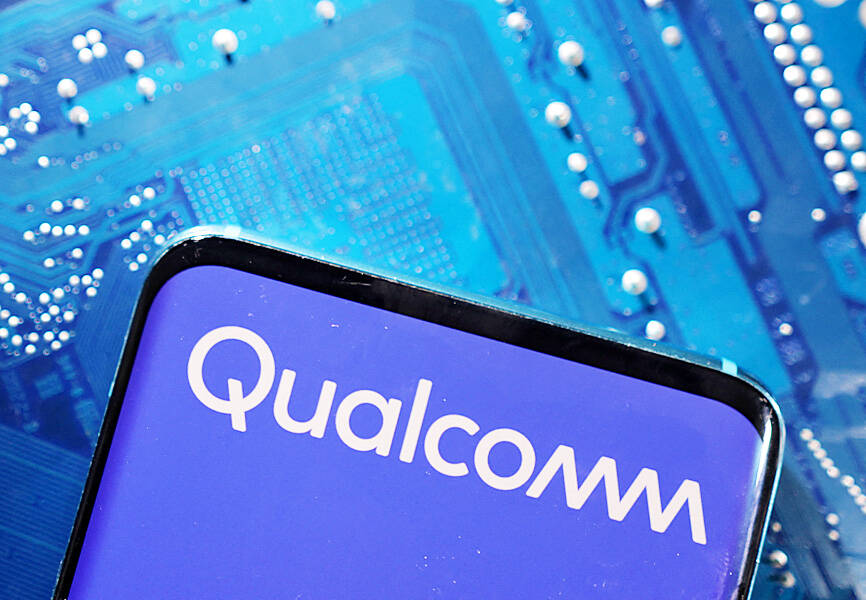Artificial intelligence (AI) chips from Qualcomm Inc beat Nvidia Corp in two out of three measures of power efficiency in a new set of test data published on Wednesday, while a Taiwanese start-up bested both in one category.
Nvidia dominates the market for training AI models, but after AI models are trained, they are put to wider use in “inference” by doing tasks such as generating text responses and analyzing images.
Analysts say that the market for data center inference chips would grow quickly as businesses put AI technologies into their products, but companies such as Alphabet Inc’s Google are already exploring how to keep the lid on the extra costs that doing so would add.

Photo: Reuters
Qualcomm has created a chip called the Cloud AI 100 that aims for parsimonious power consumption.
In testing data published on Wednesday by MLCommons, an engineering consortium that maintains testing benchmarks widely used in the AI chip industry, Qualcomm’s AI 100 beat Nvidia’s flagship H100 chip at classifying images, based on how many data center server queries each chip can carry out per watt.
Qualcomm’s chips hit 197.6 server queries per watt versus 108.4 queries per watt for Nvidia.
Neuchips Corp (創鑫智慧), a start-up founded by veteran Taiwanese chip academic Lin Youn-long (林永隆), took the top spot with 227 queries per watt.
Qualcomm also beat Nvidia at object detection with a score of 3.2 queries per watt versus Nvidia’s 2.4 queries per watt.
Object detection can be used in applications such as analyzing footage from retail stores to see where shoppers go most often.
However, Nvidia took the top spot in absolute performance terms and power efficiency terms in a test of natural-language processing, the AI technology most widely used in chatbots.
Nvidia hit 10.8 samples per watt, while Neuchips ranked second at 8.9 samples per watt and Qualcomm was third at 7.5 samples per watt.

RUN IT BACK: A succesful first project working with hyperscalers to design chips encouraged MediaTek to start a second project, aiming to hit stride in 2028 MediaTek Inc (聯發科), the world’s biggest smartphone chip supplier, yesterday said it is engaging a second hyperscaler to help design artificial intelligence (AI) accelerators used in data centers following a similar project expected to generate revenue streams soon. The first AI accelerator project is to bring in US$1 billion revenue next year and several billion US dollars more in 2027, MediaTek chief executive officer Rick Tsai (蔡力行) told a virtual investor conference yesterday. The second AI accelerator project is expected to contribute to revenue beginning in 2028, Tsai said. MediaTek yesterday raised its revenue forecast for the global AI accelerator used

TEMPORARY TRUCE: China has made concessions to ease rare earth trade controls, among others, while Washington holds fire on a 100% tariff on all Chinese goods China is effectively suspending implementation of additional export controls on rare earth metals and terminating investigations targeting US companies in the semiconductor supply chain, the White House announced. The White House on Saturday issued a fact sheet outlining some details of the trade pact agreed to earlier in the week by US President Donald Trump and Chinese President Xi Jinping (習近平) that aimed to ease tensions between the world’s two largest economies. Under the deal, China is to issue general licenses valid for exports of rare earths, gallium, germanium, antimony and graphite “for the benefit of US end users and their suppliers

Dutch chipmaker Nexperia BV’s China unit yesterday said that it had established sufficient inventories of finished goods and works-in-progress, and that its supply chain remained secure and stable after its parent halted wafer supplies. The Dutch company suspended supplies of wafers to its Chinese assembly plant a week ago, calling it “a direct consequence of the local management’s recent failure to comply with the agreed contractual payment terms,” Reuters reported on Friday last week. Its China unit called Nexperia’s suspension “unilateral” and “extremely irresponsible,” adding that the Dutch parent’s claim about contractual payment was “misleading and highly deceptive,” according to a statement

Artificial intelligence (AI) giant Nvidia Corp’s most advanced chips would be reserved for US companies and kept out of China and other countries, US President Donald Trump said. During an interview that aired on Sunday on CBS’ 60 Minutes program and in comments to reporters aboard Air Force One, Trump said only US customers should have access to the top-end Blackwell chips offered by Nvidia, the world’s most valuable company by market capitalization. “The most advanced, we will not let anybody have them other than the United States,” he told CBS, echoing remarks made earlier to reporters as he returned to Washington